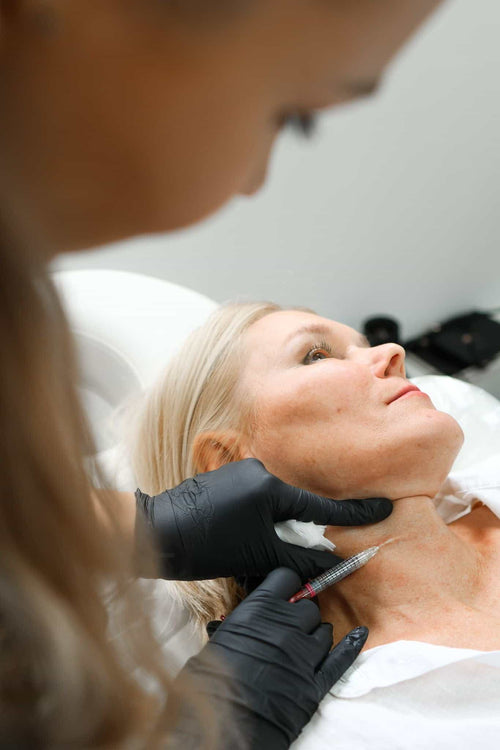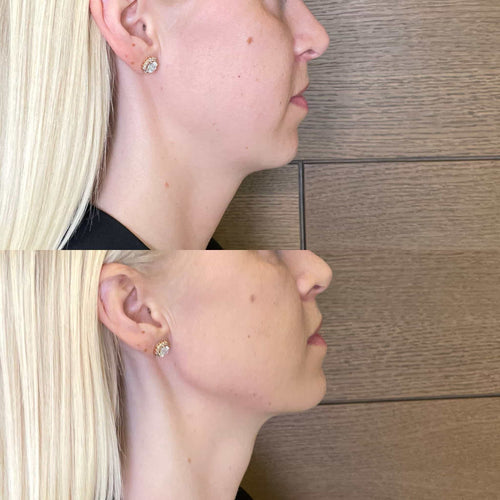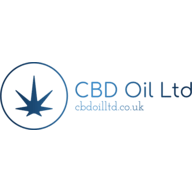Consult Dr. Laura Geige for Dermal Fillers at It’s Me and You Clinic
Immediate Steps
Cold Compresses
Immediate steps are crucial after receiving lip filler to minimize swelling and ensure proper healing.

One of the most effective immediate actions is applying a cold compress.
Cold compresses constrict blood vessels, reducing inflammation and fluid buildup in the treated area.
Apply a cold pack wrapped in a towel to your lips for 15-20 minutes at a time, several times a day for the first 24-48 hours.
Use an ice pack or frozen peas wrapped in a thin cloth for this purpose.
Avoid direct contact with the skin as it can cause frostbite.
Remember to alternate between cold compresses and rest periods to prevent tissue damage.
Book a Consultation for Dermal Fillers at It’s Me and You Clinic with Dr. Laura Geige
Elevating Your Head
Immediate Steps to Take After Lip Fillers

After receiving lip fillers, it’s crucial to follow your injector’s instructions carefully. However, some general immediate steps can help minimize swelling and promote healing.
Avoid strenuous activity or anything that might increase blood flow to your face for at least 24 hours.
Apply a cold compress to your lips for 10-15 minutes at a time, several times a day. This helps reduce inflammation and constrict blood vessels.
Stay hydrated by drinking plenty of water.
Elevating Your Head
Elevating your head while sleeping can help significantly reduce swelling. The reason is that when you elevate your head, gravity assists in draining excess fluid away from your lips.
Here’s how to do it effectively:
Use two pillows to raise your head slightly higher than the rest of your body.
Avoid lying flat on your back.
Over-the-Counter Remedies
Arnica
Over-the-counter (OTC) remedies can offer some relief for swelling after lip filler injections, but they are not a replacement for professional medical advice.
**Arnica** is a popular OTC remedy often touted for its anti-inflammatory properties. It is available in various forms, including creams, gels, tablets, and homeopathic preparations. While anecdotal evidence suggests that arnica can help reduce swelling and bruising, scientific research supporting its effectiveness for post-lip filler swelling is limited.
Applying a cold compress to the treated area can also help minimize swelling. This can be as simple as using a bag of frozen peas wrapped in a towel or an ice pack applied for 10-20 minutes at a time, several times per day. Cold temperatures constrict blood vessels, which can reduce inflammation and swelling.
Elevating the head while sleeping can help drain fluid buildup and minimize morning swelling.
Avoiding strenuous activity and excessive sun exposure in the days following lip filler injections can also contribute to a smoother recovery process.
If you experience excessive or persistent swelling, pain, redness, or other concerning symptoms, consult your doctor or a licensed aesthetic practitioner immediately.
Antihistamines Preventing Future Swelling
Over-the-counter (OTC) remedies can provide temporary relief from swelling after lip filler injections, but they won’t prevent future swelling.
Antihistamines like diphenhydramine (Benadryl) or cetirizine (Zyrtec) can help reduce inflammation by blocking histamine, a chemical released during the body’s allergic response. Swelling after lip fillers is often due to this inflammatory reaction.
Applying a cold compress for 15-20 minutes at a time can also constrict blood vessels and minimize swelling. Do this several times a day for the first few days after treatment.
It’s crucial to remember that OTC remedies only address immediate symptoms and do not prevent future swelling from occurring.
To minimize the risk of swelling in future treatments, discuss these strategies with your injector:
- Choose a qualified and experienced injector:** A skilled injector will use precise techniques to minimize trauma to the tissue, reducing the likelihood of excessive swelling.
- Use high-quality fillers:**
- Follow pre- and post-treatment instructions carefully: These may include avoiding certain medications or activities that could increase swelling.
- Be aware of individual factors:** Certain medical conditions, allergies, or medications can make you more susceptible to swelling.
Some fillers are more prone to causing swelling than others.
If you experience excessive or persistent swelling after lip filler injections, consult your injector immediately. They may recommend additional treatments or medications to manage the situation.
Choosing a Qualified Practitioner
Over-the-counter (OTC) remedies can offer some relief from swelling after lip filler, but it’s important to understand their limitations.
Reserve a Dermal Filler Session with Dr. Laura Geige Now
Applying a cold compress for 10-15 minutes at a time, several times a day, can help constrict blood vessels and reduce inflammation.
**Arnica** cream or gel may also provide some benefit, as it has anti-inflammatory properties.
Oral antihistamines like cetirizine (Zyrtec) or loratadine (Claritin) can help reduce swelling caused by allergic reactions.
It’s crucial to follow the product instructions carefully and consult a doctor if you experience any adverse reactions.
While OTC remedies can be helpful, for significant or persistent swelling after lip filler, it’s essential to seek professional medical advice.
Choosing a qualified practitioner is paramount to minimizing complications like swelling. Look for someone with extensive experience in dermal fillers and a good track record.
A reputable injector will thoroughly assess your medical history, discuss potential risks and benefits, and ensure proper injection techniques to minimize side effects.
Communication is Key
Over-the-counter (OTC) remedies can play a role in managing swelling after lip filler, but they should be used cautiously and with consultation from a healthcare professional.
Some commonly recommended OTC options include:
* **Arnica:** This herb is thought to reduce bruising and swelling. It comes in various forms, such as creams, gels, and tablets.
**Cold Compresses:** Applying ice packs wrapped in a towel for short periods (15-20 minutes at a time) can help constrict blood vessels, minimizing inflammation.
**Antihistamines:** Over-the-counter antihistamines like diphenhydramine (Benadryl) or cetirizine (Zyrtec) may help reduce swelling by blocking histamine release associated with allergic reactions.
**Pain Relievers:** Ibuprofen (Advil, Motrin) or naproxen (Aleve) are nonsteroidal anti-inflammatory drugs (NSAIDs) that can help manage pain and reduce inflammation.
**Important Considerations:
Always read the instructions on OTC medication labels carefully.
Inform your healthcare provider about any medications you’re taking, including supplements, before using OTC remedies.
Be cautious with cold compresses, as excessive use can damage skin.
While these OTC options may provide some relief, it’s crucial to remember that they are not a substitute for professional medical advice. Consult your doctor or the provider who administered the lip filler if you experience any unusual or concerning swelling, pain, or other complications.
Emri Studio W1 Wellness Kurious Kittens Democracy Defense Coalition

